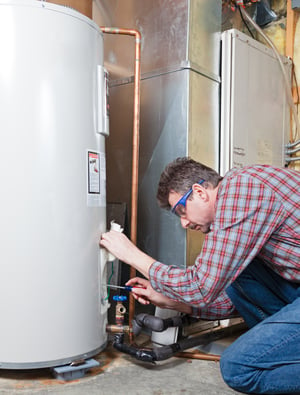Sacramento Water Heater Leaks Where and Why
Posted by William Heinselman on
 We can all agree that it is probably never a good thing when we notice a puddle, or what can seem at the time like a pond, of water lying stagnantly below a water heater. Whether units are electric, gas, solar, hybrid electric, tankless or so on, water heater leaks are dangerous to our health, our safety and our budgets.
We can all agree that it is probably never a good thing when we notice a puddle, or what can seem at the time like a pond, of water lying stagnantly below a water heater. Whether units are electric, gas, solar, hybrid electric, tankless or so on, water heater leaks are dangerous to our health, our safety and our budgets.
Once discovered, before inquiring about what caused the leak (the why), our initial reaction should be focused on identifying where the leak in the water heater is coming from. This should be done first, in order to make identifying why the leak happened easier and faster.
Typically, water heaters have some common parts:
- A drain valve
- A cold water inlet
- A sacrificial anode rod
- A dip tube
- A pressure relief valve
Where?
The most common places where a leak in a water heater can stem from are:
- From the Top of the unit
- From the Bottom
- From the Tank
- From the Fittings or Pipes
After identifying where the leak in the water heater is flowing from, you will want to evaluate whether the leak is worth the repair costs or whether it is more beneficial to purchase a new water heater altogether.
The answer to this varies, depending on whether or not you are dealing with a major leak, if it is even a leak and where the leak is coming from.
Since water heaters produce natural condensation, some water presence may not be cause for concern; however, it does become serious in nature when the water heater tank wears or rusts. This is a good indicator that the water heater needs to be replaced and not just repaired.
Why?
Now that we have identified four common places to check if a water heater is leaking, let’s identify some reasons why the leak may have initially occurred.
Reason #1: Loose Connections
If the hot or cold water pipe’s connectors or inlets are leaking, they may be fixed by just tightening them. If the leaking is still consistent after you have tightened them, then professional repair will likely be necessary.
Reason #2: Faulty Temperature or Too Much Pressure on the Relief Valve
A leak that occurs this way is a result of overheating or too much pressure on the relief valve, causing the valve to incrementally open up over time and induce a leak in the water heater.
Reason #3: Corroded Water Tank
Many water heater leaks are indicative of corroded unit tanks, which should be replaced by a professional repair technician.
Rule of Thumb
Some rules of thumb to think about when identifying leaks in a water heater are:
- Identify where the leak is first, then diagnose the unit to find out why the leak occurred
- Make a small modification/ test to see if it is a leak and not natural condensation
- A professional plumbing service is better equipped to identify, protect and safely repair or replace the water heater
Aside from a water heater’s natural condensation, if it appears to be leaking, dry off the water heater and place a towel or two where you believe it to be leaking from. Later, check the towel(s); if they are still dry, then the water heater probably didn’t have a leak and it was producing natural condensation.
However, if the towel became sopping wet, then there should be a reasonable amount of concern not only for water damage, which can affect your personal health and hygiene, but also for your time and money.




